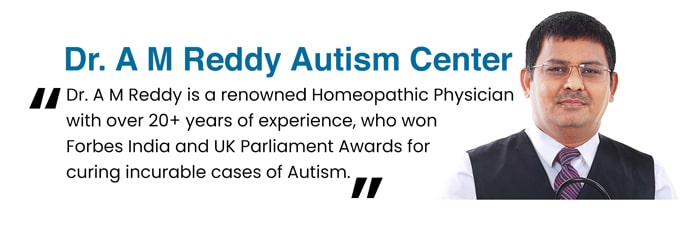ADHD and autism are two different neurodevelopmental disorders with some symptoms in common. Significant variances exist between the two, and a person can have both conditions. The differences between autism and ADHD, or attention deficit hyperactivity disorder, are discussed in this article. We also look at a link between ADHD vs Autism and homeopathy treatment possibilities.
What exactly is autism?
Autism impairs a person’s social communication and interaction in various situations. Although there is no cure in amateur medicine, homeopathy treatment assists people in making progress in areas where they are having difficulty.
According to the Dr. A.M. Reddy Autism Centre, approximately one out of every 59 youngsters is diagnosed with an autism spectrum disorder.
According to the experts from the centre, autism usually appears before a kid reaches the age of three, and boys are five times more likely than females to have it.
What exactly is ADHD?
ADHD is a neurodevelopmental condition that affects many people. ADHD affects 8.4% of children and 2.5 percent of adults, according to the Dr. A.M. Reddy Autism Centre. Males are diagnosed with it more frequently than females.
- Attention
- Hyperactivity
- Impulse control
All issues children with ADHD face are listed above. They may find it difficult to focus, sit still, or think before acting.
IS IT ATTENTION DEFICIT HYPERACTIVITY DISORDER (ADHD) OR AUTISM? OR A COMBINATION OF BOTH?
Is it possible that your child with ADHD has autism spectrum disorder (ASD)? Has it ever occurred to you that the first diagnosis was incorrect? Here are a few case studies that show how to acquire a thorough evaluation and a precise diagnosis — as well as how to support your child effectively.
WHAT IS THE CONNECTION BETWEEN ADHD AND AUTISM?
Autism is one of the most prevalent confounding factors among children with ADHD. According to the study, around two-thirds of children with ADHD have at least one comorbid disorder. According to some research, approximately half of autistic youngsters suffer from ADHD.
WHAT IS THE DIFFERENCE BETWEEN AUTISM AND ADHD?
Inattention, hyperactivity, and impulsivity are the most common symptoms of ADHD. “It’s largely a problem of self-regulation and executive function; skills that serve as the ‘brain manager’ in daily life,” explains Dr. A M Reddy, founder of A M Reddy Autism Centre.
WHAT MAKES ADHD VS AUTISM?
Keep an eye on how attentive your child is. Autism makes it difficult for people to focus on tasks they don’t enjoy, such as reading a book or solving puzzles. They may also become fixated on items they enjoy, such as playing with a specific toy. Children with ADHD frequently dislike and avoid tasks that require concentration.
On the other hand, it’s equally important for the listeners to understand that any feelings they are going through are admitting defeat.
Autism vs. ADHD
It can be difficult to distinguish between autism and ADHD, especially in younger children. The following descriptions may aid in distinguishing between the two diseases’ symptoms:
Span of attention
Children with ADHD have difficulty focusing on one activity for lengthy periods and are often distracted.
Autistic children’s interests may be restricted. They may appear to obsess over things they appreciate and have trouble focusing on things they don’t care about. They might be good at remembering facts and details, and some of them might be good at math, science, music, or art.
It’s possible that spotting these indications will be easiest while the child performs their homework. A child with ADHD may find it difficult to focus on any subject.
An autistic children may focus intensely on their favorite subjects but not on those they are less interested in.
COMMUNICATION
Communication impairments characterize autism. These issues are also present in some children with ADHD, but they usually manifest differently.
Children with ADHD are more likely to:
- Chat all the time
- Wish to have the last say
- Not pay attention to how their comments influence others
- Others’ interruptions
Autistic children are more likely to:
- Have a hard time communicating their feelings and opinions
- the trouble with eye contact and not using gestures to convey
- Focus on a single issue of discussion
- They may not be able to understand turn-taking or imaginative play
- Social encounters are not initiated or responded to
- Structure and routine
Children with ADHD might easily become bored with an uninteresting structure, such as the classroom. They may lose interest in activities if there isn’t enough variety.
Autistic children, on the other hand, frequently exhibit a desire for consistency, preferring to follow routines or systematized patterns of verbal or nonverbal conduct.
They may, for example, read the same book repeatedly or want the same meals for dinner every night. Changes in routine can induce anxiety and unhappiness.
It’s possible that spotting these indications will be easiest while the child performs their homework. A child with ADHD may find it difficult to focus on any subject.
An autistic children may focus intensely on their favorite subjects but not on those they are less interested in.
COMMUNICATION
Communication impairments characterize autism. These issues are also present in some children with ADHD, but they usually manifest differently.
- Children with ADHD are more likely to:
- Chat all the time
- Wish to have the last say
- Not pay attention to how their comments influence others
- Others’ interruptions
Autistic children are more likely to:
- Have a hard time communicating their feelings and opinions
- the trouble with eye contact and not using gestures to convey
- Focus on a single issue of discussion
- They may not be able to understand turn-taking or imaginative play
- Social encounters are not initiated or responded to
- Structure and routine
Children with ADHD might easily become bored with an uninteresting structure, such as the classroom. They may lose interest in activities if there isn’t enough variety.
Autistic children, on the other hand, frequently exhibit a desire for consistency, preferring to follow routines or systematized patterns of verbal or nonverbal conduct.
They may, for example, read the same book repeatedly or want the same meals for dinner every night. Changes in routine can induce anxiety and unhappiness.
Misdiagnosis: Causes and Consequences
It’s alarming to consider that something as terrible as autism could be misdiagnosed as ADHD. Many residents and families of our nation are confused about how this occurs. The phenomenon, however, is not as odd as it appears.
Many autisms and ADHD symptoms are similar, such as the inability to concentrate, poor social skills, restlessness, and repetitive activities. Many youngsters with similar characteristics are diagnosed with ADHD before their doctors realize that the genuine reason is autism. People can have both diseases simultaneously, which makes matters even more confusing.
Differences in Symptoms
Minor differences in symptoms can assist in determining whether ADHD is present or if another disorder, such as autism, is the real issue. Individuals with autism, for example, frequently develop a strong concentration on things they appreciate while avoiding things they despise. Children with ADHD, on the other hand, tend to lose interest in things they used to enjoy rather than becoming more concentrated on them.
Of course, obtaining an appropriate diagnosis is the best method to determine whether autism or ADHD is present. If you have reservations about a diagnosis, you should seek the advice of a mental health expert who can perform a thorough psychological examination.
Treatment using Homeopathy
Autism vs ADHD is two different disorders with some symptoms in common. Any parent or caretaker concerned that their kid is exhibiting symptoms of one or both diseases should seek medical advice.
Although neither disorder has a cure in amateur medicine, homeopathy treatments can assist children in making development in areas where they struggle.



